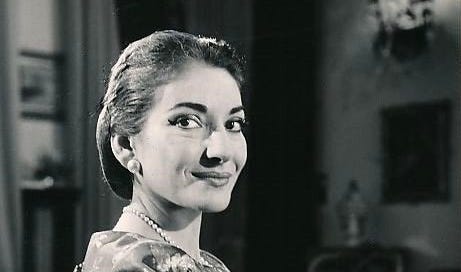Opera Daily 🎶 — Happy Birthday, Maria Callas
This week's Opera Daily celebrates the 100th anniversary of the birth of Maria Callas
👋 Hello to the new Opera Daily subscribers who have joined us this week. I hope you’re sitting on a comfortable couch with a warm beverage and enjoying your weekend. You can check out the complete Opera Daily archives and the playlist on YouTube for more selections. If you were forwarded this email by a friend, join us by subscribing here:
Yesterday marked the 100th anniversary of the birth of Maria Callas.
Callas, a soprano whose artistry and personality have become legendary, continues to inspire audiences even decades after her passing.
In celebration of her life and the mark she left on the world of opera (and me!), I wanted to revisit a post from our archives.
There is something about Maria. She is the most iconic symbol of opera. She could convey a world of emotions in a single phrase. She compelled you to listen to her, feel the music, and peer at the soul of the characters she portrayed.
I was only 12 years old when Callas taught me about opera.
She taught me to love it. She is the one who taught me that the most extraordinary singers are not those who “become” the characters they portray, but instead, they become themselves when singing the character. I always wondered why I felt I knew Maria despite just listening to her recordings and reading about her life. Callas, the singer, lets us know Maria, the woman, most intimately through these performances.
I loved the way she talked about always being in service of the music — the composer. She said when a singer is searching for a gesture or how to act on stage, all they have to do is listen to the music, and they will find every motion they need in the score. That the composer has already thought about it for you.
The way she talks about trills is a perfect example of how Maria served the music. In this masterclass, she explains that composers wrote trills in the opera scores to express the range of emotions the character feels. Her trills expressed joy, happiness, delight, ecstasy, anger, sadness, power, and fear. This is why her singing voice has been described as a “mirror held up to emotion”.
Speaking of trills….
Today we’re listening to Maria sing “Mercè, dilette amiche” from Act 5 of the Italian opera I vespri siciliani by Giuseppe Verdi. You will notice this opera sounds French! I vespri siciliani shows that Verdi had mastered the French Grand Opera style.
🎧 Treat Your Ears (4 minute listen): Maria Callas singing “Mercè, dilette amiche” from Act V of the Italian opera I vespri siciliani by Giuseppe Verdi.
I vespri siciliani (The Sicilian Vespers) is a five-act Italian opera initially written in French for the Paris Opera and translated into Italian shortly after its premiere in June 1855.
Before being married to Arrigo, in “Mercè, dilette amiche” (“Thank you, beloved friends”), Elena sings of her happiness in a dance-like fashion that feels like a Spanish boléro. While she sings about her wedding, her joy has been lessening because she has discovered that their wedding bells will signal the Sicilian uprising and massacre of the French!
Want more?
On December 2, 2013 the Google logo honored opera great Maria Callas on what would have been the singer’s 90th birthday.
What is a “trill”? Technically, it’s the rapid alternation of a note and the next note above it, keeping the ground between them nice and clean. Maria Callas, Beverly Sills, Joan Sutherland, and Shirley Verrett were the queens of the trill.
“The Callas voice was a voice of many colors, some of which strike me as exceedingly beautiful and some of which can be unpleasant. It was nature and partly art. Most voices exhibit a more consistent timbre, and so there are voices I dislike for their basic timbre and don’t care to listen to, and voices I find entirely enchanting no matter what they're singing. I always know what to expect from these voices. With Callas I don't always know what to expect, but I do always expect something interesting. Her ability to use what nature gave her and alter the timbre of her voice to express varied emotions and even to characterize entire roles is unequaled by any other singer I can think of. Callas demands that we listen with full attention to what she's doing but also be prepared to forgive some less than pleasing moments along the way. “Art,” she said, “is more than beauty.”
Another good interview with Maria from 1968 in Paris with Lord Harewood.
The highest achievement an artist can reach in music is to develop a style or unmistakable quality. After becoming familiar with such an artist, one can always recognize who this artist is after one or two measures of the performance.
This to me, is Callas.
Happy Birthday to the greatest of all time!
Grateful for your time and ears,
Michele
PS. Missed our last edition? We featured Teresa Berganza singing “Come scoglio,” from Act 1 of Wolfgang Amadeus Mozart’s opera Così fan tutte.
❤️ If you liked this piece, please hit the heart to like it (and share it too!) ❤️








Always liked Maria Callas, sings beautifully
Thank you for such a loving and informative tribute to this fabulous artist. It made me hungry to know more about her.